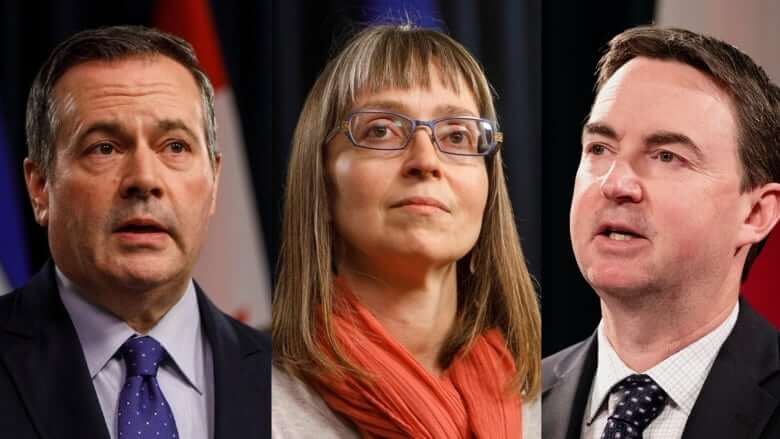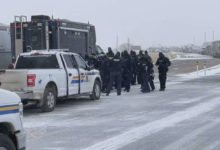Alberta’s vaccine passport will be in place into next year, Kenney says

A need to be “on our guard” through the winter means Alberta’s vaccine passport will be in place at least into early next year, Premier Jason Kenney said Tuesday, as he announced that a long-awaited app to scan proof-of-vaccination QR codes is now available.
“We are headed into an uncertain period,” Kenney told a news conference.
“Between weather, seasonal patterns, more indoor activity and the potential for waning protection, we don’t want to let down our guard — let’s say, in November, if we get out of this fourth wave — only to potentially face a Christmas spike or a winter spike.”
The AB COVID Records Verifier app is available for businesses and other organizations to download onto Apple and Android devices, Kenney said.
The app scans the QR code on enhanced vaccine records, which Albertans can obtain at alberta.ca/CovidRecords by entering basic information including their provincial health-care number.
After Nov. 15, the scannable QR code will be the only acceptable record of vaccination, Kenney said.
When the app reads a valid QR code, a green checkmark verifies the person’s vaccination. It will also display a person’s name and date of birth, which organizations are asked to check against other identification.
Kenney was joined by Health Minister Jason Copping, Dr. Deena Hinshaw, Alberta’s chief medical officer of health, and Dr. Verna Yiu, president and CEO of Alberta Health Services.
Latest deaths include teen
Alberta reported 3,358 new cases of COVID-19 over the long weekend: 1,085 on Friday, 1,039 on Saturday, 628 on Sunday and 606 on Monday. There were also 33 deaths, including a 14-year-old boy with pre-existing conditions.
As of Tuesday there were 1,053 COVID-19 patients in hospital, including 242 in ICU.
There were 15,295 active cases of the disease in the province.
Hinshaw said the falling active case numbers and a positivity rate below 10 per cent are encouraging, but said Alberta is not yet through the fourth wave and its effects on the province’s health-care system.
She said, while it was encouraging to see ICU admissions and COVID-19 hospitalizations appearing to plateau, Albertans cannot let up now.
“Our numbers are still extremely high. We remain significantly higher than any other peaks during the course of the pandemic,” Hinshaw said.
Alberta families were asked to be cautious in celebrating Thanksgiving and to abide by public health rules intended to ease the pressure on hospitals during the fourth wave.
Yiu said she has been worried about hospital capacity over the last few months.
“Today, I’m a little bit more optimistic than I’ve been in quite a while,” she said, adding that thanks to additional staff from Newfoundland and Labrador, Fort McMurray has opened two new ICU spaces.
But the situation is still very serious, she said.
“The number of Albertans needing ICU care has fallen a small amount in the past week. It’s still too early to suggest that this is a trend, but it’s a good sign and a faint silver lining to what has been a very difficult period for our health-care system.”
Alberta hospitals have struggled with capacity issues since case counts began rising this summer, along with the numbers of critically ill COVID-19 patients requiring intensive care beds.
Thousands of surgeries have been cancelled or delayed and the province has accepted medical help from the military, Newfoundland and Labrador and the Red Cross.
More than 3.2 million Albertans have received at least one dose of a COVID-19 vaccine. As of Monday, 85.3 per cent of eligible Albertans have had at least one dose, and 76 per cent are fully vaccinated.
The government also said 152,063 adult Albertans had registered as of Monday to receive a $100 debit card, which were offered as an incentive for people to get a first or second dose of a vaccine.
The program, announced in September when Alberta was facing surging cases and the lowest vaccination rate in the country, ends Thursday.








Redes Sociais - Comentários